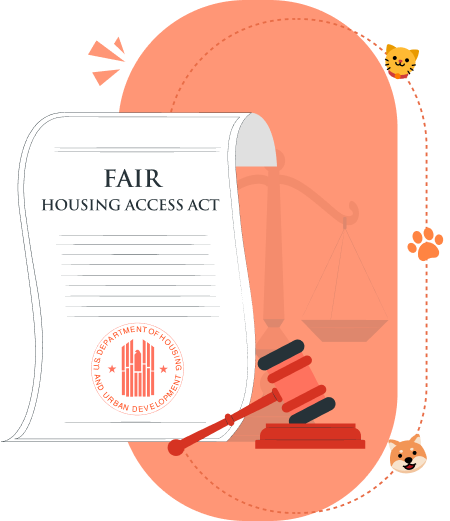Nebraska Fair Housing Act & ESA Protections
Nebraska follows the federal Fair Housing Act (FHA) and its state counterpart, the Nebraska Fair Housing Act (NFHA). Together, they require housing providers to consider reasonable accommodation requests for emotional support animals (ESAs) and explain when documentation can be requested or a request can be denied.
Key Housing Protections Under FHA/NFHA
Under the FHA and the NFHA, people with disabilities are protected from housing discrimination and may request reasonable accommodations, including the ability to live with an ESA. These laws explain what housing providers can ask for, when they must say “yes,” and the narrow circumstances when a request can be denied. The goal is to ensure equal housing opportunity without unnecessary barriers.
Landlords must consider ESA requests, even in buildings with no-pet policies. Also, approved ESAs are not pets for fee purposes; no pet rent or pet deposits may be charged. However, tenants remain responsible for actual damages caused by the animal.
- When a Request Can Be Denied
Only in limited cases, such as a direct threat to health/safety, significant property damage, undue administrative or financial burden, or a fundamental alteration of the housing provider’s operations. Determine on a case-by-case basis, not based on breed or stereotypes.
If the disability or need isn’t obvious, a housing provider may request reliable disability-related information, typically an ESA letter Nebraska from a licensed mental health professional who has evaluated the tenant. Although landlords cannot require a specific form or ask for detailed medical records.
- Where It Applies (Coverage)
Most rental housing, including apartments, single-family rentals, student housing, assisted living, and nursing homes. Narrow exemptions may apply (e.g., certain owner-occupied buildings with four or fewer units).
In short, a properly approved ESA is not treated as a pet for fee or deposit purposes, though tenants remain responsible for any actual damage. To keep things smooth, submit requests in writing, respond promptly to reasonable information requests, and work through the interactive process. If issues arise, guidance is available from HUD and the Nebraska Equal Opportunity Commission.
Pricing
PSD Letter
Reviews
ESA By States
ESA Laws
Resources


